Mike Friedman, Special Contributor to GolfTheMidAtlantic.com
Photos by Rydercup.com
Curtis Strange isn't the villain responsible for the US team's loss in the Ryder Cup. His pairings were clearly well thought out, and the results of the first two days prove that he was effective in managing his team. On Sunday, however, there's room to critique Strange's strategy, and many have. There's a good argument that Strange should've placed the top-ranked players (Tiger, Phil, Davis Love III) in early singles matches to ensure their matches would be relevant to the overall result (which Strange didn't do, putting these players last, instead).
But it likely wouldn't have made much difference this time. Those tearing into Strange neglect to mention that the U.S. actually split the opening three matches (1½ to 1½). More importantly, while it appears that Paul McGinley's putt to halve his match with Jim Furyk was the decisive blow, the fact remains that it wouldn't have been nearly as crucial if Mickelson hadn't already lost his match (one that the U.S. saw as a 'lock'). As it turned out (everything else being the same), if Tiger, Phil and Davis had swept the final three matches as expected, the U.S. would have won 14½ to 13½. Strange's strategy would've worked after all.
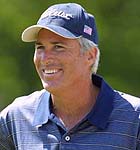 |
| Curtis Strange |
And who's to say that the top-ranked players are necessarily the best in a match play format, anyway? The recent history of the Ryder Cup suggests otherwise. Who plays well on any given day has a lot more to do with circumstances than it does with tour rankings (as Price's win over Mickelson showed in spades).
The opponent, course layout, ability to handle pressure (as single shots/putts often have more meaning in match play), and how one feels physically that day, are all more important than rankings.
You could have put Tiger up against Colin Montgomerie in the first match, and Montgomerie still would've smoked him, the way he was putting. You could've put up the ghosts of Hogan, Snead and Sarazen, and the result wouldn't have been any different. Criticism of Strange is way off base.
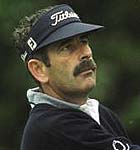 |
| Sam Torrance |
Other miscellaneous thoughts from the 2002 Ryder Cup:
Paul Azinger's bunker shot on the 18th was one of the most amazing shots in Ryder Cup history, even though it only delayed the inevitable by one match. But if Furyk had made his (an almost identical shot to win his match that missed by about an inch), followed by wins by Love and Woods (whose unfinished matches were halved by agreement), the word 'miracle' wouldn't have been strong enough.
Sergio Garcia's enthusiasm and attitude are refreshing and good for the game. Reporters indicated that several U.S. players were bothered by his antics. Too bad! I was rooting for the U.S., but I always enjoy watching Sergio play. He injects life into an often-staid game. As long as he isn't distracting other golfers from their games, his exuberance is fine. Perhaps a little Sergio-like emotion on the part of the American players (like they showed three years ago at Brookline) would have fired up the U.S. team, and led to more inspired performances overall.
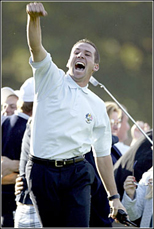 |
| Sergio Garcia |
Azinger's claim that Torrance set the course up to give the Europeans an edge sounds like an excuse. Whether such a strategy is even possible, given 12-man teams, it should be fairly utilized by captains of the home team. The host is supposed to have a slight advantage, just as home teams enjoy in other sports.
David Toms is a joy to watch. He seems to have ice in his veins. He never appears bothered by a situation. Here's hoping he qualifies for Ryder Cup 2004.
Were the U.S. fans watching how the European fans behaved? Here's hoping the U.S. fans follow the Europeans' example, and don't embarrass themselves and their country in 2004 by taunting and disrupting the European players.
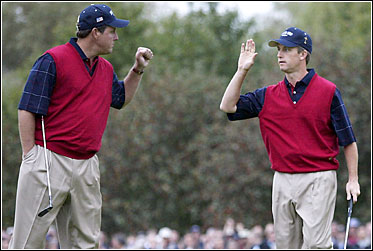 |
| Phil Mickelson, David Toms |
A hot putter goes a long way in a Ryder Cup match, whether it's singles or team competition.
Not only was the U.S. tabbed as the favorite without careful thought by many commentators, the European win is now predictably labeled an 'upset.' Europe has now won or tied 6 out of the last 9 Ryder Cups. Will the U.S. be favored in 2004? Probably. Should they be? You decide.
Individual Ryder Cup records are misleading and talked about far too much by golf experts. Often a player plays horribly and gets a win due to his partner's success, and some wins are due to poor play by an opponent.
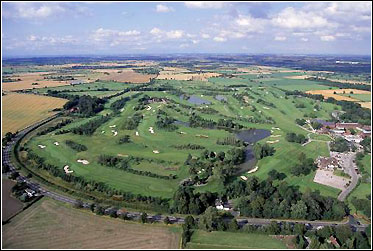 |
NBC needs to show delayed misses more often. It seemed that every time the coverage cuts to a shot made 2 minutes earlier, it was a made putt, or an approach to about 2 feet away. The problem is that some of the suspense is lost. Understandably, NBC cannot catch every important shot live when 12 matches are played simultaneously. Nevertheless, showing a few more delayed shots that were poorly hit would at least avoid tipping off the viewer that the delayed shot being shown will be a good one.
Doesn't it seem that the U.S. players are feeling more pressure in recent Ryder Cups no matter the site? The European players know they aren't overmatched because the format trumps the individual player rankings. Somehow, though, they seem capable of convincing themselves as a group that they are underdogs, and play like they have nothing to lose.
The Ryder Cup is now the most exciting golf event going. It has an Olympics-type feel due to the alternate year schedule, and the number of high-pressure, critical shots in one weekend dwarfs what you would see in any PGA tournament, including the majors.
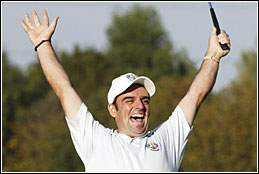 |
| Paul McGinley and the winning putt |
How about including the rest of the world in the Ryder Cup?
Here's how: Play it over two weekends (separated by an off weekend for travel) with four teams. The teams could be Europe, The United States, Asia/Canada/Mexico/South America, and Australia/Africa. The first round would rotate so that a team plays a different team first each year. The two winners of the first weekend would play two weeks later in the final. A true Olympics of golf that involves the entire world and brings in players like Els, Goosen, Price, Weir, Maruyama, Norman, Elkington, Singh, etc… The teams other than Europe and the U.S. could be configured in the fairest way to promote competitive matches and include all countries. Elimination of the President's Cup (which really hasn't caught on except with golf aficionados) would barely be noticed. The match play format would even out any perceived advantage held by teams with more high-ranked players.
It's hard to imagine how the competitions could be more exciting, but the 'world' Ryder Cup would achieve it. Golf is truly a global game, and competitions like the Ryder Cup prove that the United States doesn't own a monopoly on talent, or flare. Here's looking forward to 2004!
Details:
| Related Links | Comments on this article? | |
|
Maryland National Golf Club Hollow Creek Golf Club Rocky Gap Resort PB Dye Golf Club in Ijamsville Whiskey Creek Golf Club |
E-mail Jeff Rendall, Editor: jrendall@golftheunitedstates.com |











